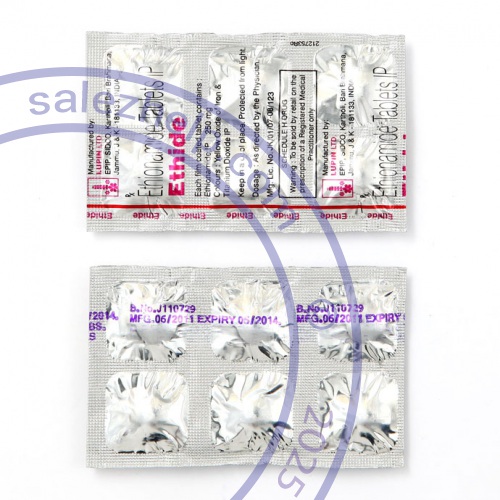Trecator-SC
Trecator-Sc is a medication used to treat tuberculosis (TB). It works by stopping the growth of TB bacteria in the body. It is usually taken in combination with other TB medications for optimal treatment outcomes. Trecator-Sc is available in tablet form and is typically taken twice a day with food. It is important to follow the prescribed dosage and duration of treatment as directed by a healthcare provider.
- 250mg
What is Trecator-Sc and how does it work?
Trecator-Sc is a medication used to treat tuberculosis (TB). It works by stopping the growth of TB bacteria in the body. It is usually taken in combination with other TB medications for optimal treatment outcomes. Trecator-Sc is available in tablet form and is typically taken twice a day with food. It is important to follow the prescribed dosage and duration of treatment as directed by a healthcare provider.
What are the common side effects of Trecator-Sc?
The common side effects of Trecator-Sc include nausea, vomiting, stomach upset, headache, dizziness, and drowsiness. These side effects usually go away on their own within a few days of starting the medication. However, if these symptoms persist or become severe, it is important to speak with a healthcare provider.
How long does it take for Trecator-Sc to work?
The length of time it takes for Trecator-Sc to work varies depending on the severity of the TB infection and the individual's response to the medication. In general, it can take several weeks to several months to see significant improvement in symptoms. It is important to continue taking the medication as prescribed, even if symptoms improve, to ensure complete eradication of the TB bacteria.
Can I drink alcohol while taking Trecator-Sc?
It is generally not recommended to drink alcohol while taking Trecator-Sc. Alcohol can increase the risk of side effects such as dizziness and drowsiness. Additionally, alcohol can interfere with the effectiveness of the medication in treating TB. It is important to speak with a healthcare provider about any concerns regarding alcohol consumption while taking Trecator-Sc.
Can Trecator-Sc be taken during pregnancy or breastfeeding?
Trecator-Sc is not recommended for use during pregnancy unless the benefits outweigh the risks. It is also not known if Trecator-Sc passes into breast milk, so it is generally not recommended for use during breastfeeding. It is important to speak with a healthcare provider if pregnancy or breastfeeding is a concern while taking Trecator-Sc.
Can Trecator-Sc interact with other medications?
Trecator-Sc can interact with other medications, including anticoagulants, anticonvulsants, and certain antibiotics. It is important to inform a healthcare provider of all medications being taken, including over-the-counter medications and supplements, to avoid potential interactions.
How is Trecator-Sc dosed?
Trecator-Sc is typically dosed at 15-20mg/kg/day, divided into two doses taken with food. The dosage and duration of treatment may vary depending on the severity of the TB infection and the individual's response to the medication. It is important to follow the prescribed dosage and duration of treatment as directed by a healthcare provider.
What should I do if I miss a dose of Trecator-Sc?
If a dose of Trecator-Sc is missed, it should be taken as soon as possible. However, if it is almost time for the next scheduled dose, the missed dose should be skipped and the regular dosing schedule should be resumed. It is important to not double the dose to make up for a missed dose.
Can Trecator-Sc be taken with food?
Trecator-Sc should be taken with food to help minimize stomach upset and nausea. It is recommended to take Trecator-Sc with a full glass of water and to avoid lying down for at least 30 minutes after taking the medication.
How is TB monitored during treatment with Trecator-Sc?
TB is typically monitored through regular chest x-rays and sputum cultures to check for the presence of TB bacteria. It is important to continue taking Trecator-Sc as prescribed, even if symptoms improve, to ensure complete eradication of the TB bacteria. A healthcare provider will monitor TB treatment progress and adjust the treatment plan as needed.
What are known local names of the medication?
- Ethomid
- Ethimide
- Etionamid
- Ethion
- Ethiozid
- Ethionamide
- Trescatyl
- Isoniazid ethionamide
- Tibonamide
- Trecator
- Myobid

